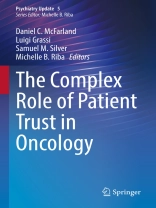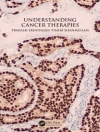This book presents a comprehensive portrait of trust in medicine and oncology. Trust is vital to medical care. It is linked to treatment recommendation adherence, continuity of care, and even treatment efficacy under certain scenarios, and is distinct from other commonly measured patient-reported outcomes that are used to drive medical practice, such as patient satisfaction. Cancer care highlights many of the issues with trust that all clinicians confront and brings to light the interplay of technology, rapidly advancing treatments, and readily available information consumed by patients and families that may complicate clinician-patient communication.
Each chapter highlights a different aspect of trust in the medical setting, many of which are specific to oncology. For example, trust is fundamental to the first encounter with an oncologist. The anatomy of that encounter is explored. The elements of trust are investigated, from the institutional or fiduciary perspective to thenuances of the personal and individual encounters with patients. Several key factors are relevant to trust within these encounters, such as the patient’s background, attachment style, and perception of ethically responsible commitment. Further chapters cover topics like the proliferation of false information, health inequities, and patient-centered care.
The Complex Role of Patient Trust in Oncology will be of great interest to oncologists, psychiatrists, internists, and any healthcare professional interested in the role of trust in patient care.
Daftar Isi
Chapter 1: The Relational Component of Trust in Oncology.- Chapter 2: Fiduciary or not? Healthcare Systems and Oncology.- Chapter 3: Medical Oversight and Public Trust of Medicine: Breaches of Trust.- Chapter 4: The First Encounter with Oncology: Patient Experience and Requisite Trust.- Chapter 5: The role of trust in oncology across populations and cultures: implications for health inequities and social justice.- Chapter 6: Patients on the Internet: The Information Age and Trust in Medicine, Conspiracies, and Proliferation of False Information.- Chapter 7: Patients and Trust: The Impact of Advocacy to Advance Patient-Centered Care.- Chapter 8: Trust and the Role of Attachment: implications for oncology.- Chapter 9: Patient Trust through the Lens of Integrative Oncology.- Chapter 10: Building Trust and Future Directions.
Tentang Penulis
Daniel Mc Farland, D.O., Associate Professor Medicine, Psychiatry, Director of Psycho-Oncology, Wilmot Cancer Center, University of Rochester Medical Center, Rochester, NY, USA.
Luigi Grassi, M.D., Professor and Chair, Department of Neuroscience and Rehabilitation University of Ferrara, Institute of Psychiatry, Ferrara, Italy. Dr. Grassi is past president of the International Psycho-Oncology Society
Samuel M. Silver, M.D., Ph.D., Assistant Dean for Research, Emeritus, Professor of Internal Medicine, Emeritus, University of Michigan Medical School, Ann Arbor, MI, USA.
Michelle B. Riba M.D., M.S., Professor of Psychiatry, Department of Psychiatry; Director of Psych-Oncology Program at the University of Michigan, Rogel Cancer Center, Ann Arbor, MI, USA. Dr. Riba is past president of the American Psychiatric Association.












